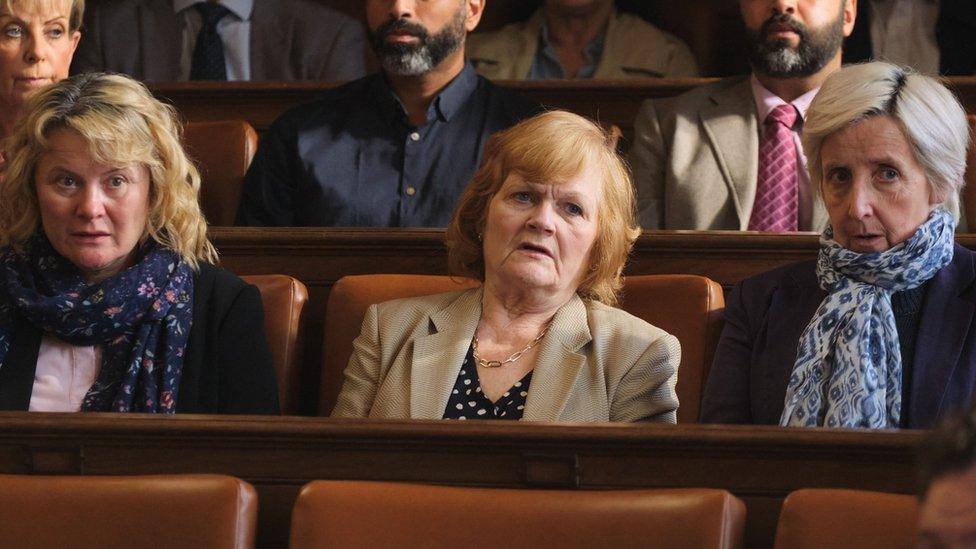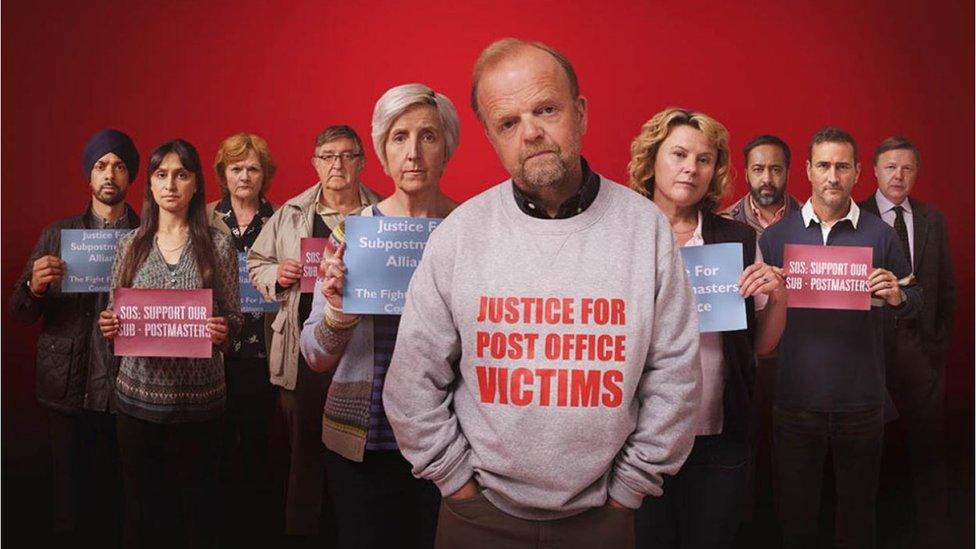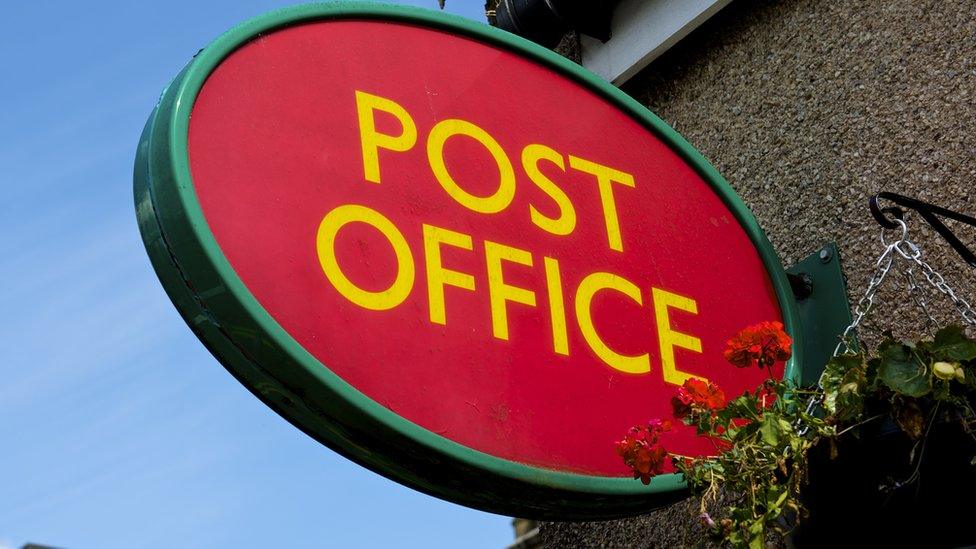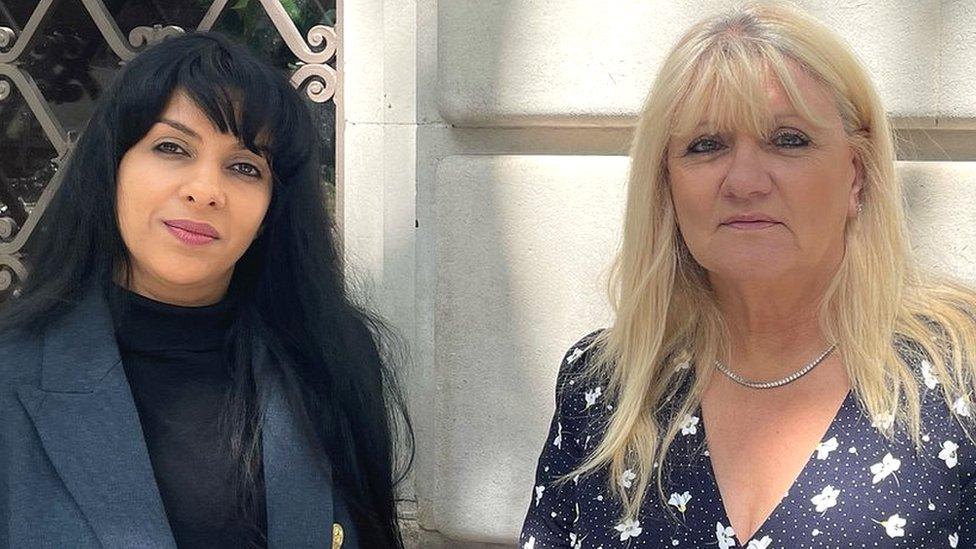Post Office scandal: Rishi Sunak considers measures to clear all victims
- Published
Watch: Sunak says Post Office scandal is "appalling miscarriage of justice"
Measures are being considered by the government to clear the names of hundreds of sub-postmasters convicted in the Post Office Horizon scandal.
More than 700 branch managers were convicted of false accounting, theft and fraud based on faulty software.
Fewer than 100 people have had their convictions quashed.
The prime minister said the government was reviewing options - including stripping the Post Office of its role in the appeal process.
The Post Office had the power to decide on bringing the original prosecutions and its appointed lawyers presented the evidence in court. But one option now would be for the Crown Prosecution Service and its own lawyers to step in as appeals continue to be heard.
Many victims of the scandal - which began in 1999 - are still fighting to have their convictions overturned or to secure full compensation after being forced to pay out thousands of pounds of their own money for shortfalls that were caused by Horizon accounting software.
Lee Castleton, a former postmaster who said his life has been ruined by the Post Office, told the BBC: "I'm really, really angry."
Rishi Sunak told the BBC's Sunday with Laura Kuenssberg that the scandal was "an appalling miscarriage of justice".
The Post Office - which is wholly-owned by the government - acted as the prosecutor when it brought the cases against its sub-postmasters and retains a role when those individuals appeal.
In some cases it has opposed attempts by sub-postmasters to clear their names.
Asked by Laura Kuenssberg if the Justice Secretary Alex Chalk was looking at whether all those convicted could be exonerated or the Post Office could be stripped of its role, Mr Sunak said: "Obviously, there's legal complexity in all of those things but he is looking at exactly those areas that you've described.
"It is right that we find every which way we can do to try to make this right for the people who were so wrongfully treated at the time."
Last month, a board overseeing compensation called for all Post Office staff wrongly accused of theft and false accounting to have their convictions overturned.
Watch: I'm really, really angry - postmaster gets emotional
The Crown Prosecution Service could step into the Post Office's role in the appeals process.
But Sir Bob Neill, chair of the Justice Select Committee, suggested such a move could require extra resources and have a knock-on effect on other cases.
"The Director of Public Prosecutions [Stephen Parkinson] has to take that decision themselves, they have to do it independently," he said. "I'm sure they'd look at it, they have to look at each case independently on its merits. To do that I think you'd probably need extra resources.
"And then the final point is, of course, the Court of Appeal would have to make time to hear these cases and so there would need to be the agreement of the Ministry of Justice to make judges available and that might mean other cases going further down the queue."
The Ministry of Justice said last month that it wanted the criminal appeals system to be as efficient and effective as possible, adding that it had asked the Law Commission to examine whether reforms were needed, and was waiting for that review to be concluded.
Mr Castleton said that people were being"traumatised" by both the appeals process and the battle to secure compensation, describing it as a "war".
"We're just normal people", he told the BBC, adding that it should be taken out of the "hands of the people that really caused it".
"I would love it to be taken out of the hands of the people that really caused it in a way," he said."This is not just a computer issue, this is a people issue.
"People took people to court. People made decisions on faulty data that they probably knew was faulty."

Watch the Panorama special that reveals damning evidence kept from those whose lives were devastated: Panorama - The Post Office Scandal

A Post Office spokesperson said: "We share fully the aims of the public inquiry to get to the truth of what went wrong in the past and establish accountability. It's for the inquiry to reach its own independent conclusions after consideration of all the evidence on the issues that it is examining."
The Metropolitan Police is now investigating the Post Office over potential fraud offences arising from the prosecutions.
Potential offences could relate to "monies recovered from sub-postmasters as a result of prosecutions or civil actions", it said.
The Met has already been examining potential offences of perjury and perverting the course of justice in relation to investigations and prosecutions carried out by the Post Office.
Two people have been interviewed under caution but nobody has been arrested since the investigation was launched in January 2020.
The Met announced its new investigation after 50 new potential victims of the scandal came forward following an ITV drama on the issue, which aired this week.

ITV's Mr Bates vs the Post Office drama - a scene from which is seen here - has led to renewed anger over the scandal
Between 1999 and 2015 more than 700 sub-postmasters were prosecuted and convicted based on information from the Horizon accounting system which made it look like money was missing.
Some sub-postmasters wrongfully went to prison, many were financially ruined and forced to declare bankruptcy, while others describe being shunned by their communities following convictions for false accounting and theft. Some have since died.
To date, 93 convictions have been overturned and, of those, only 30 people have agreed "full and final settlements", external.
Some 54 cases have resulted in convictions being upheld, people being refused permission to appeal, or people withdrawing from the process, according to the Post Office.
A public inquiry into the scandal is ongoing.
There has been widespread sympathy for the victims - and renewed anger - after the four-part mini-series Mr Bates vs the Post Office: The Real Story aired on ITV this week.
It centres on the story of sub-postmaster Alan Bates, played by actor Toby Jones, who led and won a legal battle, paving the way for dozens of convictions to be overturned.
Lord Arbuthnot, who was Jo Hamilton's MP when she was wrongly convicted of false accounting - a conviction that was quashed in 2021 - said that "there needs to be retribution on those who are responsible".
The ITV series focuses on the Post Office's former chief executive, Paula Vennells. But Lord Arbuthnot said: "There are so many people who behaved so very badly that I think it is probably wrong to focus on one person.
"At the moment, scores of people have got away with things which they should not have got away with and I hope they will not as a result of the public inquiry run by Sir Wyn Williams."
Until 2012, the Post Office was part of Royal Mail before it was split off. Between 2003 and 2010, Adam Crozier was chief executive of Royal Mail. He went on to lead ITV and is now chairman of BT.
He was replaced by Dame Moya Greene who ran Royal Mail for eight years, during which time the company was privatised and listed on the London Stock Exchange in 2013.
Dame Moya was given £250,000 of public money to help her buy a house in the UK when the Canadian took over the running of Royal Mail. The company said in its annual report for 2013 , externalthat "additional assistance, on the purchase of a home, was offered given the difference in residential costs between the UK and Canada".
Following objections by the then Business Secretary Sir Vince Cable, Dame Moya handed back £120,000 - the amount she received after tax.

Listen to the BBC Sounds podcast that tells the extraordinary story: The Great Post Office Trial

Related topics
- Published6 January 2024

- Published15 December 2023

- Published21 December 2023

- Published17 July 2023
